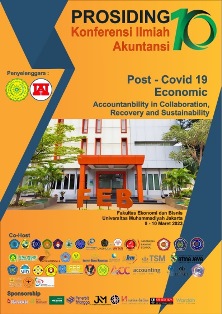DEFAULT RISK, PROFITABILITAS, KEBIJAKAN DEVIDEN DAN EARNINGS RESPONSE COEFFICIENT
Abstract
Tujuan penelitian: Penelitian ini bertujuan untuk membuktikan secara empiris faktor-faktor seperti Default Risk, Profitabilitas, Kebijakan Deviden terhadap Earnings Response Coefficient. Variabel independen penelitian Default Risk, Profitabilitas, Kebijakan Deviden dan variabel dependen penelitian yaitu Earnings Response Coefficient. Perusahaan yang menjadi objek penelitian yaitu perusahaan farmasi yang terdaftar di Bursa Efek Indonesia pada periode amatan tahun 2015 sampai 2021.Desain/metode/pendekatan: Sampel penelitian menggunakan 9 dari 12 perusahaan farmasi yang terdaftar di Bursa Efek Indonesia yang diambil berdasarkan teknik purposive sampling. Analisis penelitian menggunakan Regresi Data Panel dengan data cross section dan time series.Hasil penelitian: Default Risk secara parsial mempunyai pengaruh negatif signifikan terhadap Earnings Response Coefficient. Profitabilitas secara parsial mempunyai pengaruh positif signifikan terhadap Earnings Response Coefficient. Sedangkan Kebijakan secara parsial tidak mempunyai pengaruh terhadap Earnings Response Coefficient. Secara simultan dapat disimpulkan bahwa Default Risk, Profitabilitas dan Kebijakan Dividen berpengaruh positif signifikan terhadap Earnings Response Coefficient.Kontribusi teori: Hasil penelitian ini dapat dijadikan kontribusi bagi Signalling Theory dan Decision Theory.Kontribusi praktik: dapat digunakan dalam pengambilan keputusan investasi karena unsur pembangun dari earnings response coefficient adalah cumulative abnormal return dan unexpected earning. Apabila earnings response coefficient-nya positif dan besar maka hal ini sesuai dengan harapan investor.Keterbatasan: Perusahaan farmasi yang go public masih sedikit di Indonesia, sehingga sampel yang digunakan juga terbatas. Penelitian mengenai earnings response coefficient pada perusahaan farmasi juga masih sangat sedikit.Keterbaruan: masih sangat sedikit penelitian-penelitian akuntansi yang terbaru mengenai Earnings Response Coefficient serta faktor-faktor yang mempengaruhinya.References
Referensi Buku
Gujarati, N. Damodar., Porter, C. Dawn. (2014). Basic Econometrics, 5th edition (Dasar-Dasar Ekonometrika Buku 1, Edisi 5). The McGraw-Hill Companies, Penerbit Salemba 4 Jakarta.
Gujarati, N. Damodar., Porter, C. Dawn. (2014). Basic Econometrics, 5th edition (Dasar-Dasar Ekonometrika Buku 2, Edisi 5). The McGraw-Hill Companies, Penerbit Salemba 4 Jakarta.
Juanda, Bambang., Junaidi. (2012). Ekonometrika Deret Waktu Teori dan Aplikasi. Penerbit PT. Penerbit IPB Press, Kampus IPB Taman Kencana Bogor.
Scott, William R. (2015). Financial Accounting Theory (7th). Canada: Pearson
Referensi Publikasi Ilmiah
An, Yohan. (2015). Earnings Response Coefficients and Default Risk: Case of Korean Firms. International Journal of Financial Research Vol. 6, No. 2; 2015.
Ball, R. and Brown, P. (1968), “An empirical evaluation of accounting income numbers”, Journal of Accounting Research, Vol. 6 No. 2, pp. 159-178.
Collins, D.W. and Kothari, S.P. (1989), “An analysis of intertemporal and cross-sectional determinants of earnings response coefficients”, Journal of Accounting and Economics, Vol. 11 Nos 2/3, pp. 143-181.
Dechow, P., Ge, W. and Schrand, C. (2010), “Understanding earnings quality: a review of the proxies, their determinants, and their consequences”, Journal of Accounting and Economics, Vol. 50 Nos 2/3, pp. 344-401.
Dhaliwal, D., and Reynolds, Stanley S. (1994). “The Effect of the Default Risk of Debt on the Earnings Response Coefficient.” The Accounting Review, vol. 69, no. 2, 1994, pp. 412–19. JSTOR.
Dhaliwal, D., Lee, K., & Fargher, N. (1991). The Association Between Unexpected Earnings and Abnormal Security Returns in the Presence of Financial Leverage. Contemporary Accounting Research, 20-41.
Firmansyah, Amrie & Herawaty, Vinola. (2019). Pengaruh Income Smoothing, Kebijakan Deviden, Leverage Dan Ukuran Perusahaan Terhadap Earnings Response Coefficient Dan Future Earnings Response Coefficient. Jurnal Informasi Perpajakan Akuntansi Dan Keuangan Publik. Vol.11 No.1 Januari 2016, Hal. 31-48
Ghosh, A. and Moon, D. (2005), “Auditor Tenure and Perceptions of Audit Quality”, The Accounting Review, Vol. 80 No. 2, pp. 585-612.
Hasanzade, M., Darabi, R., Mahfoozi, G. (2014). Factors affecting the earnings response coefficient: An empirical study for Iran. European Online Journal of Natural and Social Sciences, Česká Republika, 2, jul. 2014.
Husiano, Dwi & Suratno. (2014). Analisis Pengaruh Beta, Leverage, Dividend Payout Ratio, dan Earnings Persistence terhadap Earnings Response Coefficient pada Indeks Kompas 100. Jurnal Riset Akuntansi dan Perpajakan, JRAP Vol. 1 no. 2, hal 121-135
Kim, Y.C., Seol, I. and Kang, Y.S. (2018), "A Study on The Earnings Response Coefficient (ERC) Of Socially Responsible Firms: Legal Environment And Stages Of Corporate Social Responsibility", Management Research Review, Vol. 41 No. 9, pp. 1010-1032.
Lesmana, M. Dedy; Defung, Felisitas & Fakhroni, Zaki. (2022). The Effect of Characteristic Firm on Voluntary Disclosure and Earnings Response Coefficient at the ManufakturingCompany of Consument Goods Sector. International Journal of Business and Management Invention (IJBMI). Volume 11 Issue 10, October 2022, PP 51-63.
Lintner, John, (1956), “Distribution of Incomes of Corporations Among Dividends, Retained Earnings, and Taxes.” The American Economic Review, Vol. 46, No. 2, (May, 1956), pp. 97-113.
Liu, T., Jiang, Y. and Hao, L. (2021), "Short-Sale Refinancing and Earnings Response Coefficient: Evidence from China", International Journal of Accounting & Information Management, Vol. 29 No. 1, pp. 127-146.
Mahendra, I Putu Y. & Wirama, Dewa G. (2017). Pengaruh Profitabilitas, Struktur Modal, dan Ukuran Perusahaan pada Earnings Response Coefficient. E-Jurnal Akuntansi Universitas Udayana, 20 (3), p. 2566-2594, Sep. 2017.
Mc Nichals, M (2002). Discussion of The Quality of Accruals and Earnings, The Role of Accruals Estimations Errors, Accounting Review, 77, 61-69.
Nofianti, Nana. (2014). Pengaruh Struktur Modal, Ukuran Perusahaan, Dan Kebijakan Dividen Terhadap Koefisien Respon Laba. Jurnal Etikonomi Vol. 13 No. 2 Oktober 2014
Teoh, S.H. and Wong, T.J. (1993), “Perceived Auditor Quality and The Earnings Response Coefficient”, The Accounting Review, Vol. 68 No. 2, pp. 346-366.
Sitasi Informasi Organisasi/Institusi
Billings, Bruce K., Revisiting the Relation between the Default Risk of Debt and the Earnings Response Coefficient. Available at SSRN: https://ssrn.com/abstract=185611.

